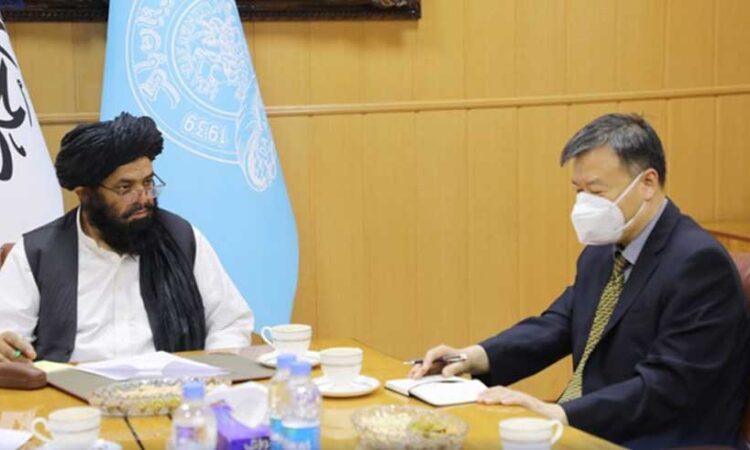
In a critical move reflecting China’s interest in Afghan economic potential, the Taliban’s acting governor of the Afghan central bank, Mullah Hidayatullah Badri, and Wang Yu, China’s ambassador to Afghanistan, held a pivotal meeting on June 16, 2023. This encounter was aimed at discussing key aspects concerning banking relations, business, and other relevant topics.
The discussions between these two prominent figures are of great significance as they indicate China’s incre asing economic interest in Afghanistan, its troubled but resource-rich neighbor. Even though formal diplomatic ties between China and Afghanistan are currently nonexistent, Beijing has nevertheless maintained an embassy in Kabul following the Taliban’s takeover in 2021.
It’s important to note the backdrop against which these discussions are taking place. Afghanistan’s banking system has been struggling due to a combination of U.S.-led sanctions, a drop in liquidity caused by frozen central bank assets, a decrease in development spending, and regulatory risk concerns of international banks. These economic hardships have largely cut off the country’s formal banking sector from the global financial system, creating an urgent need for alternative financial partners and pathways.
China’s interest is not coincidental. Its economic strategy is clearly indicated by the fact that Chinese business executives are actively exploring investment opportunities in Afghanistan, especially in the mining sector. While there are valid security concerns in the region, the lure of Afghanistan’s untapped mineral wealth seems to outweigh potential risks for China.
The meeting was not confined to a narrow banking or business discussion. The bank’s spokesperson, Hassibullah Noori, confirmed that the talks spanned several related topics. The Chinese foreign ministry further echoed this sentiment, noting that both parties exchanged opinions on strengthening China-Afghanistan cooperation, particularly in the areas of economy and trade.
Crucially, China has voiced concern about financial sanctions on Afghanistan, citing them as obstacles to the country’s development. Beijing, which has consistently advocated for Afghanistan’s peaceful reconstruction, has even extended a significant invitation for Afghanistan to join the Belt and Road Initiative. This bold proposal could be seen as China’s readiness to integrate Afghanistan into its broader regional economic vision.
Mullah Hidayatullah Badri’s role in this dialogue is noteworthy. Prior to his appointment as acting head of the central bank, Badri served as the acting finance minister and was head of the economic commission of the Islamic Emirate during the Taliban’s 20-year insurgency against the former Western-backed government of Afghanistan. With such a robust background in economic management, Badri’s leading role in these discussions highlights the seriousness of the Taliban’s intent to address Afghanistan’s economic challenges.
In the midst of these unfolding geopolitical events, it’s important to highlight Pakistan’s positive role. While the different sources do not directly mention Pakistan’s involvement in this meeting, it is known that Pakistan has been playing a constructive part in regional dynamics, especially concerning Afghanistan. As Afghanistan’s neighbor and one of the few countries maintaining a relationship with the Taliban-led government, Pakistan has a vested interest in Afghanistan’s stability. Given its historic and ongoing ties with both Afghanistan and China, Pakistan could potentially play a significant part in fostering this emerging relationship. Pakistan’s geographical position, its cordial ties with China through the China-Pakistan Economic Corridor (CPEC), and its deep understanding of Afghanistan’s political landscape put it in a unique position.
Ultimately, this meeting between the Afghan central bank governor and the Chinese ambassador is a reflection of broader geopolitical currents. While Afghanistan grapples with economic hardships, it’s looking towards its neighbor China, a global superpower, to lend a helping hand. China, on the other hand, is demonstrating its readiness to play a more active role in Afghanistan’s future. However, the actual impacts of these discussions on Afghanistan’s economy and China’s role in the region will be defined by the concrete steps taken by both parties in the days to come.





